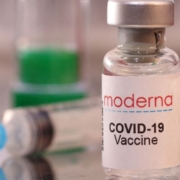The U.S. Food and Drug Administration on Jan. 31 gave full approval to Moderna Inc.’s COVID-19 vaccine for people ages 18 and older, making Spikevax the second fully approved vaccine for the virus.
Don’t Count Out Omicron Sibling BA.2, and More COVID-19 News
BNT162b2 (Pfizer and BioNTech), Brain, Business, Clinical Trials, Coronavirus Disease (COVID-19) Pandemic, Coronavirus Vaccines, Covid Brain Fog, COVID-19 cases, COVID-19 Vaccines, Cytokines, Data, Delta Variant (B.1.617.2; India), Denmark, FDA, HIV, HIV Vaccines, Long COVID, Moderna, mRNA-1273/Moderna COVID-19 Vaccine (Moderna), Omicron (B.1.1.529) (South Africa), Omicron BA.2, R&D, Researchers, Stanford University, The Bill and Melinda Gates Foundation, University of California, San FranciscoThe prevailing theory about the Omicron variant is that it is going to rip through the population quickly and possibly burn out, marking the downside of the COVID-19 pandemic. But researchers are expressing concern about a subvariant of Omicron dubbed BA.2 that appears to be tearing through Denmark, just as the first Omicron wave subsided.
Studies Forge On as Omicron Surges and More COVID-19 News
BNT162b2 (Pfizer and BioNTech), Clinical Trials, Coronavirus Disease (COVID-19) Pandemic, COVID-19 Studies, COVID-19 Therapeutics, COVID-19 Vaccines, Data, Hospitalized COVID-19 Patients, Inhaled Formulations, Janssen COVID-19 Vaccine (J&J), mRNA-1273/Moderna COVID-19 Vaccine (Moderna), New England Journal of Medicine, Omicron (B.1.1.529) (South Africa), R&D, Therapeutics, VentilatorsIn the last two years, the sheer volume of scientific research focused on COVID-19 has been astounding: thousands of clinical studies, dozens of vaccines and new compounds, and hundreds of approved drugs tested for efficacy. More studies are still being run, especially in light of the Omicron surge and the virus’ ability to evolve.
Moderna starts trial for Omicron-specific booster shot
Adults 18 & Older, BNT162b2 (Pfizer and BioNTech), CDC, Clinical Trials, Coronavirus Disease (COVID-19) Pandemic, COVID-19 Vaccines, Messenger RNA (mRNA) Vaccines, Moderna, mRNA-1273/Moderna COVID-19 Vaccine (Moderna), Omicron (B.1.1.529) (South Africa), Pfizer, R&DModerna Inc. started a mid-stage study, testing a booster dose of the company’s COVID-19 vaccine specifically designed to target the Omicron coronavirus variant, a day after rival Pfizer Inc. launched a similar trial.
Pfizer, Moderna shots safe during in vitro fertilization; healthy gut bacteria may help prevent long COVID
Bacteria, BNT162b2 (Pfizer and BioNTech), Clinical Trials, COVID-19 cases, COVID-19 Studies, COVID-19 Test Kits, COVID-19 Vaccinations, COVID-19 Vaccines, Covid-19 Variants, Gut microbes, In-Vitro Fertilization, JAMA, Long COVID, Microbiome, mRNA-1273/Moderna COVID-19 Vaccine (Moderna), Myocarditis, Portable PCR COVID-19 Test Kits, R&D, SARS-CoV-2 virus, Small IntestineCOVID-19 vaccines using mRNA technology do not affect fertility outcomes during in-vitro fertilization (IVF), researchers found. Other new findings suggest the bacteria living in the small intestine may contribute to the risk for long COVID after infection with SARS-CoV-2.
About 35% of People Who Received Placebo in Vaccine Trials Report Side Effects and More COVID-19 News
Adverse Events, BNT162b2 (Pfizer and BioNTech), Business, CDC, Clinical Trials, COVID-19 Antibodies, COVID-19 forecasts, COVID-19 Studies, COVID-19 Vaccines, Harvard Medical School, Intensive Care Units (ICUs), JAMA, Janssen COVID-19 Vaccine (J&J), Johnson & Johnson, Long COVID, mRNA-1273/Moderna COVID-19 Vaccine (Moderna), Nature Communications, Omicron (B.1.1.529) (South Africa), Placebo, R&D, Side Effects, The NetherlandsAccording to a recent study conducted by researchers at Harvard Medical School and Beth Israel Deaconess Medical Center, 76 percent of the adverse side effects (such as fatigue or headache) that people experienced after receiving their first COVID-19 vaccination were also reported by participants who received a placebo shot.
U.S. studies highlight the need for COVID boosters to fight Omicron
BNT162b2 (Pfizer and BioNTech), CDC, COVID-19 booster shots, COVID-19 cases, Covid-19 Data, COVID-19 shots, COVID-19 Studies, COVID-19 Vaccines, JAMA, Messenger RNA (mRNA) Vaccines, mRNA-1273/Moderna COVID-19 Vaccine (Moderna), Omicron (B.1.1.529) (South Africa), United StatesThree U.S. studies show that a third dose of an mRNA vaccine is key to fighting the Omicron coronavirus variant, providing 90% protection against hospitalization due to COVID-19, the U.S. Centers for Disease Control and Prevention (CDC) said on January 21.
Small children getting less sick from Omicron; Genetic mutation protects against severe COVID
BNT162b2 (Pfizer and BioNTech), Breakthrough COVID-19, Children, COVID-19 Vaccines, Delta Variant (B.1.617.2; India), Genetic Mutations, JAMA, mRNA-1273/Moderna COVID-19 Vaccine (Moderna), Nature Genetics, Omicron (B.1.1.529) (South Africa), R&D, Researchers, Severe Covid-19In very young children, the Omicron variant of the coronavirus causes less severe disease than the Delta variant, according to a new study. In other research, new findings add to evidence that people with a certain version of a gene are less likely to develop severe COVID-19.
Moderna is poised to commercialize the company’s COVID-19 and influenza combination vaccine by the fall of 2023, with some potential for the same drug to also be viable against respiratory syncytial virus (RSV).
Moderna Inc.’s vaccine candidate against the Omicron coronavirus variant will enter clinical development in the next few weeks and the company expects to be able to share data with regulators around March, CEO Stephane Bancel said on Jan. 17.










